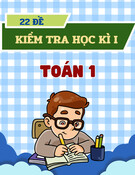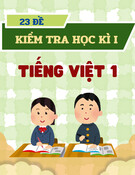
PHÒNG GIÁO DỤC VÀ ĐÀO TẠO
HUYỆN LONG ĐIỀN
TRƢỜNG THCS MẠC ĐĨNH CHI
ĐỀ KIỂM TRA GIỮA HỌC KỲ I
NĂM HỌC 2021 – 2022
MÔN: TIẾNG ANH – LỚP: 9
Thời gian làm bài: 50 phút
I. Multiple choice (6ms)
1. I didn‟t finish my homework…………….I was seriously ill yesterday.
a. when b. although c. sothat d. since
2. You‟d better bring your raincoat……………..rain pour down.
a. in case b. when c. as d. until
3. My parents once took me to Bat Trang village. I could make my own ………….there.
a. pottery b. lacquer c. painting d. sculpture
4. Lan is very …………because her closest friend is moving to another city.
a. depressed b. disappointed c. happy d. delighting
5. Osaka has become one of the …………..“liveable” city in Asia.
a. more b. better c. much d. most
6. China is by far …………country in the world.
a. most populated b. the most populated c. more populated d. the best
7. She asked me…………………...
a. If I like pop music b. if I don‟t like pop music
c. if I liked pop music d. if pop music I liked
8. She said she was cooking dinner…………………
a.here b. now c. there d.then
9. I invited her to join our trip to Trang An, but she ……….my invitation.
a. turned down b.passed down c. went out d.came back
10.The city has recently …………a library in the West Suburb.
a. find out b. set up c.take off d.bring out
11. Nga: I will pick you up at eight o‟clock on my way to the airport.
Lan: ……………….
a. For pleasure b. Great. I‟ll see you then. c. I have a phone. d. Would be.
12. Peter and Jane said to me: “Our wedding will be held next week”.
a.Peter and Jane said to me that my wedding would be held next week.
b.Peter and Jane said to me that their wedding would held the next week.
c.Peter and Jane said to me that their wedding would be held the following week.
d.Peter and Jane said to me that their wedding would be held next week.
II. Reading:
A. Lexical(2ms)
VENICE
Venice is a beautiful city in northeastern Italy. It is called “ The Floating City” as it
is……(1)………..on 117 small islands. This city has no roads, instead, people use boats to

travel along the canals. Flat-bottomed boats were once the main
means…(2)…………………transport, but today motor boats are more (3)…..………… In
Venice, you can visit the famous Piazza San Marco with its world famous basilica, the lovely
bridges over the narrow canals, and some of the (4)……………..museums in Western
Europe.
1.a. building b. build c. built d. was built
2.a. of b. off c. for d. to
3.a. populated b. expensive c. popular d. difficul
4.a. most b. best c. second c. better
B. Read the passage and choose the best answer. (2ms)
Last month, we went to Doi Tam, a village famous for its drum making techniques, in
Ha Nam Province. The craft was first introduced to the village in the 8th or 9th century.
Today there are more than six hundred drum makers living in Doi Tam village.
I was amazed to see big drums in front of every house in the village. People say that it
takes four workers three days to make a drum with a diameter of 1.5 metres. To make a drum,
the craftsmen have to follow an eight stage process. Stretching the drumhead is the most
challenging stage since they have to carefully assess the sound it makes. The other steps do
not require such high skills.
Nowadays, Doi Tam drums are not only famous in Viet Nam but are also sold to other
countries such as Laos, Cambodia, Japan, and the USA.
1. When was the craft first introduced to the village?
a. 8th century b. 9th century c.8th or 9th century d. between 8th and 9th
2. How many stages do the craftsmen have to follow to make a drum?
a. five stages b. six stages c. seven stages d.eight stages
3. How many drum makers are there in Doi Tam village today?
a.sixteen b. sixty c.six hundred d.six thousand
4. Are Doi Tam drums sold to Japan, and the USA?
a. No, they aren‟t. b. Yes, they are. c. Yes, they do d.No, they don‟t.

PHÒNG GIÁO DỤC VÀ ĐÀO TẠO
HUYỆN LONG ĐIỀN
TRƢỜNG THCS MẠC ĐĨNH CHI
ĐÁP ÁN ĐỀ KIỂM TRA GIỮA HỌC KỲ I
NĂM HỌC 2021 – 2022
MÔN: TIẾNG ANH – LỚP: 9
Thời gian làm bài: 50 phút
ĐÁP ÁN
1. D
2. A
3. A
4. A
5. D
6. B
7. C
8. D
9. A
10. B
11. B
12. C
13. C
14. A
15. C
16. B
17. C
18. D
19. C
20. B

PHÒNG GIÁO DỤC VÀ ĐÀO TẠO
HUYỆN LONG ĐIỀN
TRƢỜNG THCS MẠC ĐĨNH CHI
MA TRẬN ĐỀ KIỂM TRA GIỮA HỌC KỲ I
NĂM HỌC 2021 – 2022
MÔN: TIẾNG ANH – LỚP: 9
Thời gian làm bài: 50 phút
Chủ đề
Nhận biết
Thông hiểu
Vận dụng
Tổng
TN
TL
TN
TL
TN
TL
I. Use of
English
Vocabulary: 2
Grammar: 2
Conjunction: 2
Phrasal Verbs: 2
Comparison: 2
Conversation: 1
11 câu
5,5 đ
II. Reading
Read the passage and
choose the correct word.
8 câu: 4 đ
8 câu
4đ
III.Writing
Rewrite
1câu: 0,5đ
1 câu
0,5đ
Tổng
11 câu: 5,5 đ
8 câu: 4 đ
1 câu:0,5 đ
20 câu
10 đ

PHÒNG GIÁO DỤC VÀ ĐÀO TẠO
HUYỆN LONG ĐIỀN
TRƢỜNG THCS MẠC ĐĨNH CHI
ĐỀ CƢƠNG ÔN TẬP KIỂM TRA GIỮA HỌC KỲ I
NĂM HỌC 2021 – 2022
MÔN: TIẾNG ANH – LỚP: 9
Thời gian làm bài: 60 phút
A. LÝ THUYẾT
UNIT 1:LOCAL ENVIRONMENT
I.COMPLEX SENTENCES
1.Định nghĩa
Định nghĩa: - Câu phức là câu bao gồm 1 mệnh đề độp lập (independent clause) và ít nhất 1
mệnh đề phụ thuộc (dependent clause) liên kết với nhau. Hai mệnh đề thường được nối với
nhau bởi dấu phẩy hoặc các liên từ phụ thuộc (subordinating conjuntions).
Ví dụ: He always takes time to play with his daughter even though he is extremely busy.
Mệnh đề độc lập Mệnh đề phụ thuộc
Even though he is extremely busy, he always takes time to play with his daughter.
Mệnh đề phụ thuộc Mệnh đề độc lập
(Mặc dù anh ấy bận rộn, nhưng anh ấy luôn dành thời gian để chơi với con gái
2.Các loại mệnh đề phụ thƣờng gặp.
Mệnh đề phụ
Ví dụ
Mệnh đề phụ chỉ lý do
Thường bắt đầu với các liên từ như:
because, since, as....
This department store is an attraction in my city
because the products are of good quality.
Mệnh đề phụ chỉ thời gian:
Thường bắt đầu với các liên từ như:
When,While,before,after, as soon as....
I hurried to see him after I had heard the news.
I hope to pay him a visit before I went away.
Mệnh đề phụ chỉ mục đích.
Thường bắt đầu với các liên từ như: so that,
in order to that...
The artisan moulded the clay so that he could make a
mask.
Mệnh đề phũ chỉ sự nhượng bộ
Thường bắt đầu với các liên từ như :
Although , Eventhough, Though…
Although she was tired, she finished knitting the
scraft foe her dad..
II. PHRASAL VERBS
1. Định nghĩa
Định nghĩa
Ví dụ
Cụm đông từ ( Phrasal verb) là sự kết hợp
giữa một động từ và một tiểu từ( particle)
-Tiểu từ có thể là một trạng từ, hay là một
giới từ, hoặc là car hai chẳng hạn như: back,
in, on, off, through, up...
- Khi thêm tiểu từ vào sau động từ, cụm động
từ thường có ý nghĩa khác hẳn so với từ ban
đầu.
-The rich man gave away most of his fortune.
-You can look up any new words in your
dictionary.
-I tried to phone her but I didn‟t get through






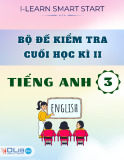
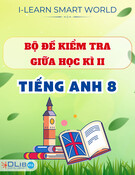

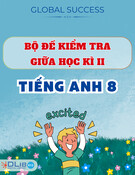
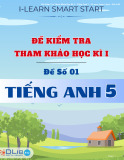

![Đề thi Tiếng Anh có đáp án [kèm lời giải chi tiết]](https://cdn.tailieu.vn/images/document/thumbnail/2025/20250810/duykpmg/135x160/64731754886819.jpg)
